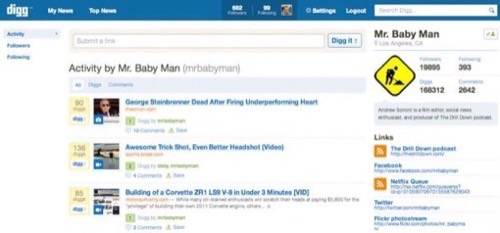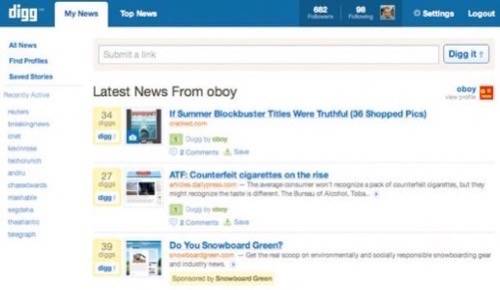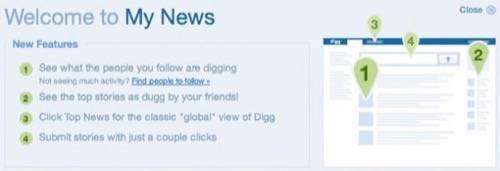The new version of Digg has changed the playing field for two of its biggest constituents: power users and publishers. We discuss this with a long-time Digg power user.
The latest version of social news site Digg is currently in restricted beta, with an additional 20,000 users added at the beginning of July. The new version adds the ability to “follow” people or publishers via a feature called “My News.” This will be the default Digg home page, and it’s prompted many to compare the new Digg to Twitter and Facebook. Another big change is that publishers may now automatically submit their content. This changes the game for both power users and publishers, because previously the secret to getting onto the Digg front page was for a power user to submit the story. That’s no longer the case.

Power Users on Digg
Follow ReadWriteWeb on the new Digg
Up till now, the definition of a “power user” on Digg has been someone with the ability to make stories popular simply by submitting content or “digging” it up. There was also a lot of back-scratching that happened behind the scenes among both power users and publishers: ‘You digg my content, I’ll digg yours.’ Digg has attracted a lot of criticism in the past for these practices inside its community.

Simply put, Digg’s power users wielded a lot of power because they dictated which publishers got pushed onto the Digg homepage. Digg is a large source of traffic for publishers, particularly tech news publications. In the past, tech sites like Ars Technica and Engadget have received a hugely disproportionate number of Digg frontpages, compared to other tech sites, since they were favored by power users.
With the new Digg, publishers may opt in to having their articles auto-submitted to Digg via RSS feed. But will this stop the gaming?
How The New Digg Affects Power Users
We spoke to Digg power user JD Rucker, a.k.a. oboy on Digg, to discuss the impact of Digg’s changes on his community.
Rucker recently wrote a post entitled The New Digg: A Shift in the Balance of Power, which argued that “the new Digg will make many current ‘power users’ impotent” but also create opportunities for new types of power users.
In an interview with ReadWriteWeb, JD Rucker explained that “rather than submit [articles], current long-time power users will be able to expose content that they like through their Diggs.”
This list of diggs is similar to a list of daily tweets, since people follow what the power user diggs. It’s also similar to Facebook, because other users may ‘like’ what they digg by digging it too.
The idea, said Rucker, is that the power users who succeed at attracting followers will become “tastemakers” – which is the term Digg founder Kevin Rose used when he announced the new Digg in May.

What Happens Behind The Scenes
Many people aren’t aware of the amount of “gaming the system” which goes on in the social Web. I consider myself fairly naive about a lot of it. But I know this much: despite the altruistic front of many successful people in the social Web, many of them have gamed their way to the top.
The following is how JD Rucker explained how Digg’s power users will (or won’t) adjust to the new Digg. It also reveals the power games that are played on the site:
“They [power users] can still network via IM and control publisher accounts to keep themselves relevant, but the vast majority will fail miserably because they won’t be able to adjust to the new algo[rithm].
They’ll spam, spam, and spam some more until they either give up and move on to other sites or abort operations altogether.
Others are already planning on leaving.
The “savvy” ones who have built-up networks not reliant on IM, [and] who will also have access to multiple and/or strong publisher accounts, will soar.”
I asked Rucker what he meant by “control publisher accounts.” He replied with this generic example: “Bob Power User, who is getting paid by RandomDiggDependentSite.com, is currently using his and his team’s power user accounts to submit.” Rucker described this as “a small cottage industry.”
That’s right, some power users control publisher Digg accounts. This practice will continue on the new Digg.

A Whole New Ballgame: Let The Games Begin…
We like to write about how wonderful the social Web is and how it has improved society and business. That’s certainly true, but the Web is also big business, and it is ruthlessly gamed by many social media ‘pundits’ and publishers alike. The new Digg is partly an attempt to clean up some of that on its site by preventing its power users from controlling the submission of content.
JD Rucker stated in his post that the new Digg showed “guts” because it is such a big change. I agree. The new Digg cleverly mimics Twitter and Facebook, becoming a place where you can ‘follow’ influencers and publishers to get your daily news fix. What’s more, power users now have the opportunity to attract large followings, which is a chance for some of them to become influential personalities.
However, the new Digg won’t stop the games of power users and the publishers who glom onto them. There’s too much (online) power and money at stake. It’s game on again!
Follow ReadWriteWeb on the new Digg
















